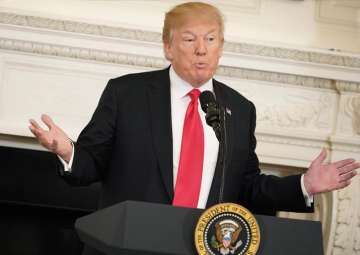US President Donald Trump said here on Thursday that he would impose tariffs on imports of steel and aluminium products, in a move he said would protect US industry, but which experts said could hurt US producers and face legal challenges from trade partners.
The US is set to impose 25 per cent of tariff on steel imports and 10 per cent for aluminium, Xinhua quoted Trump as saying in a meeting with business executives.
"We'll be signing it next week. And you'll have protection for a long time in a while," said Trump.
News of the tariffs immediately hit sentiment on the Wall Street, with the Dow slumping over 500 points, more than two per cent, in late trading.
Daniel Ikenson, a senior fellow at the Cato Institute, said on Thursday that trade restrictions could hurt US producers by exposing them to competitions from foreign rivals with lower production costs capable of offering lower prices in the US market.
US actions would face legal challenge by other World Trade Organization members, and they would also invite other members to invoke national security to protect favoured industries, said Ikenson.
European Union (EU)'s trade chief Cecilia Malmstrom has said that EU would seek retaliation measures if the Trump administration's 232 trade investigation brings damage to European steelmakers.
It's still unknown whether Trump's announcement on Thursday refer to blanket tariffs for all countries.
In April last year, Trump ordered the Commerce Department to study the impact of steel and aluminium imports on national security under seldom-used section 232 of the 1962 Trade Expansion Act.
Two weeks ago, the Commerce Department unveiled its recommendations for Trump to restrict imports of steel and aluminium products due to national security concerns, which drew opposition from US lawmakers and businesses.
According to the recommendations, the US could introduce at least 24 per cent tariff on all steel imports from all countries and at least 7.7 per cent tariff on all aluminium imports from all countries.
Trump's announcement on Thursday was higher than both recommendations.
Latest World News

